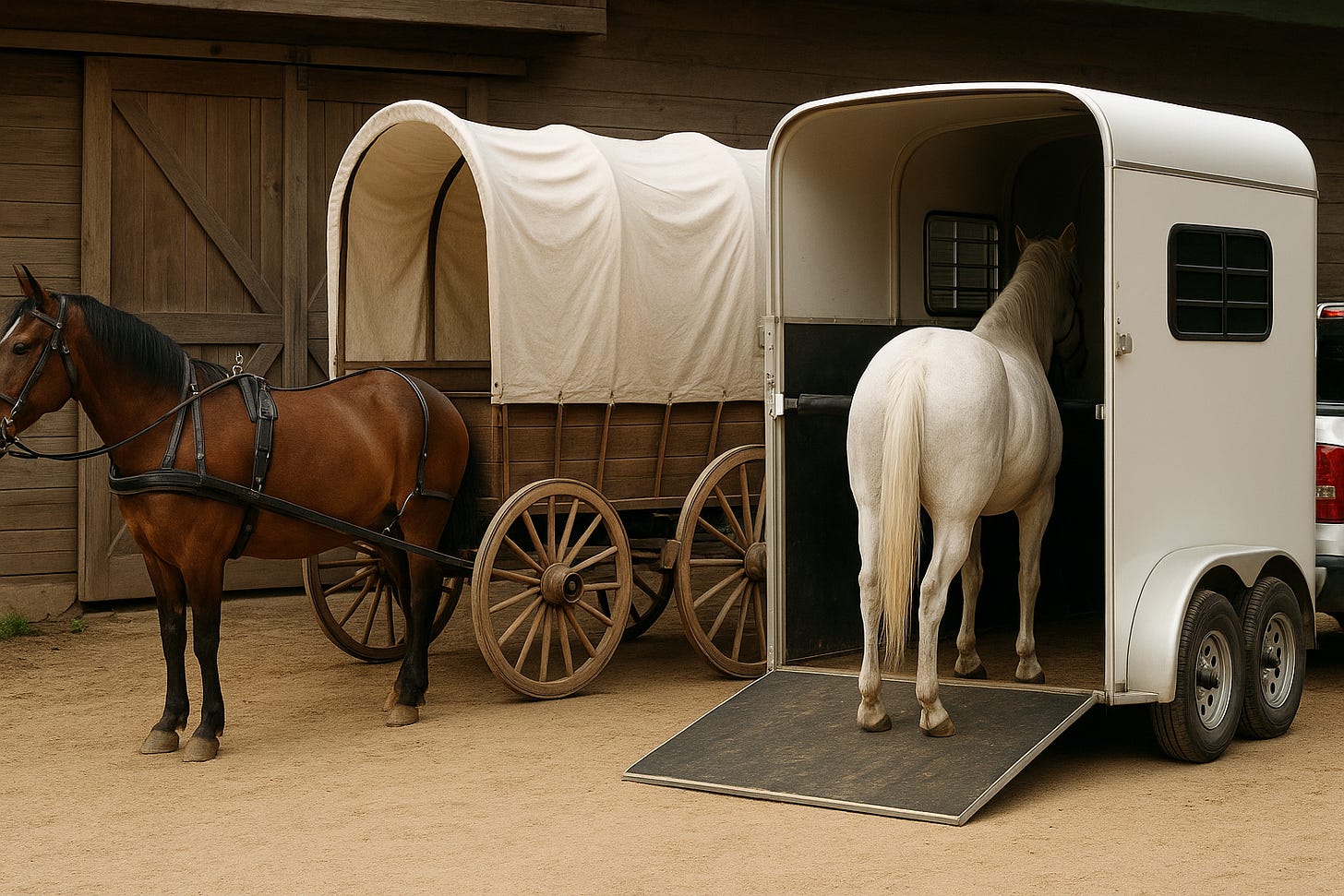Somewhere in rural America, a horse stands in quiet triumph inside a plush, rubber-floored trailer hitched to a Ford Super Duty. Its hay is pre-fluffed, the windows are tinted, and a fan hums to keep the air circulating just so. Outside, a human in cargo shorts and wraparound sunglasses checks the tie-downs and double-knots the lead rope. A meme captures the moment perfectly: Then—a horse pulling a wagon. Now—a wagon pulling the horse. Caption: “Well played, horse, well played.”
Indeed.
It’s funny because it’s true. The beast of burden has become the pampered passenger. But it’s also a mirror: the joke isn’t just on the horse—it’s on us. This isn’t regression. It’s ritual. We’ve outsourced necessity to machinery, but then brought the old world along for the ride because we liked how it felt. In doing so, we’ve revealed something essential about ourselves: that the human species advances with one foot firmly stuck in the past, and the other tapping a touchscreen.
The Horse Who Won the Long Game
There was a time when horses were as essential as Wi-Fi. They plowed fields, pulled freight, charged into war, and bore the full weight of humanity’s ambition. And for their trouble? Saddles. Yokes. Cannon fire. Then came steam. Then combustion. Then electric. The horse was dethroned by horsepower.
And yet, the horse still thrives—on ranches, at shows, in therapy centers, and backyard paddocks across suburbia. Its status today? Icon. Investment. Emotional support mammal. Not only has the horse survived its obsolescence, it’s been elevated. No longer a tool of toil, it is now a living heirloom.
Where others faded into the dustbin of history—the ox, the scythe, the saddlebag telegraph—the horse negotiated a retirement plan. Humans may have replaced it, but they never stopped admiring it. Or feeding it. Or hauling it around like equine royalty.
The result? The only laborer in history to get decommissioned and still receive free room, board, and transportation.
Steam-Punked Progress
We are not, contrary to the TED Talk industrial complex, a purely forward-facing species. For every quantum leap, we build a time machine. We don’t just move on—we curate our past.
The return of vinyl records didn’t happen because they’re better. They aren’t. They crackle and warp and cost more. But they feel better. The needle dropping. The album art. The ritual. Spotify gives you a million songs in your pocket; vinyl gives you one record in your hand. One is convenience. The other is communion.
We see the same pattern in our tech. Retro keyboards with clacky caps. Smartwatches styled like analog divers. Cameras that simulate film grain. Every app that mimics a real-world object—your Notes app with its lined yellow paper—is a digital prosthetic for tactile memory. We make progress, but we dress it in nostalgia. As if technology needs a costume change before we’ll trust it.
The Old Ways as Leisure Class
In a perverse twist, the things we once did to survive have become our hobbies.
Sourdough starters. Hand-planed furniture. Wool spinning. Axe throwing. Hunting with falcons. We cosplay our ancestors for fun. Not because we want to return to pre-industrial living—we like antibiotics and plumbing—but because we sense something missing in frictionless existence. We’re too efficient. Too optimized. And so we create artisanal friction. Leisurely difficulty. Voluntary toil.
The blacksmith once shaped iron to keep shoes on hooves and hinges on doors. Today, he runs a YouTube channel with a million subscribers and an Etsy store selling “Viking-inspired bottle openers.” Progress didn’t erase him—it gave him a Patreon.
The same is true of horses. Trail riding isn’t transit. Dressage isn’t agriculture. But the appeal is undeniable. We want to touch something older than our operating system. To move with an animal. To not be in control of every variable. To feel the world respond in hoofbeats and wind.
Technostalgia: Progress With a Side of Pining
We put horses in trailers now because we no longer need them to get anywhere. And yet, we still want them around. That’s the paradox. We let go of the old ways just far enough to miss them.
This is why the horse trailer is such a perfect metaphor. It’s not that the horse became useless—it became sacred. We didn’t discard it. We enshrined it. And we literally drag it with us. Forward motion, retro cargo.
It’s why we build steampunk aesthetics into video games and wear leather aprons at craft fairs. Why we buy cast iron skillets in a world of nonstick. Why a manual transmission isn’t just a car feature—it’s a personality type.
We aren’t hypocrites. We’re preservationists with ADD.
Bridled By Choice
So yes—the horse is riding shotgun in history now. But it’s not a story of decline. It’s a blueprint.
In a world obsessed with efficiency, speed, and automation, we carve out space for slowness, ritual, and imperfection. We take the very things we once resented—manual labor, slow travel, unskilled tools—and turn them into lifestyle brands. We call it “rustic,” “vintage,” or “heritage.” But really, it’s a form of controlled regression. A way to revisit the past without surrendering the future.
The horse no longer hauls us to battle. It hauls our nostalgia. And in doing so, it reminds us: not everything old must be buried. Some things deserve to be pulled forward—at 65 miles per hour, in a climate-controlled rig, with hay from a local co-op.
Well played, horse. Well played.
Thank you for your time today. Until next time, God Bless.
Do you like what you read but aren’t yet ready or able to get a paid subscription? Then consider a one-time tip at:
https://www.venmo.com/u/TheCogitatingCeviche
Ko-fi.com/thecogitatingceviche

















Share this post